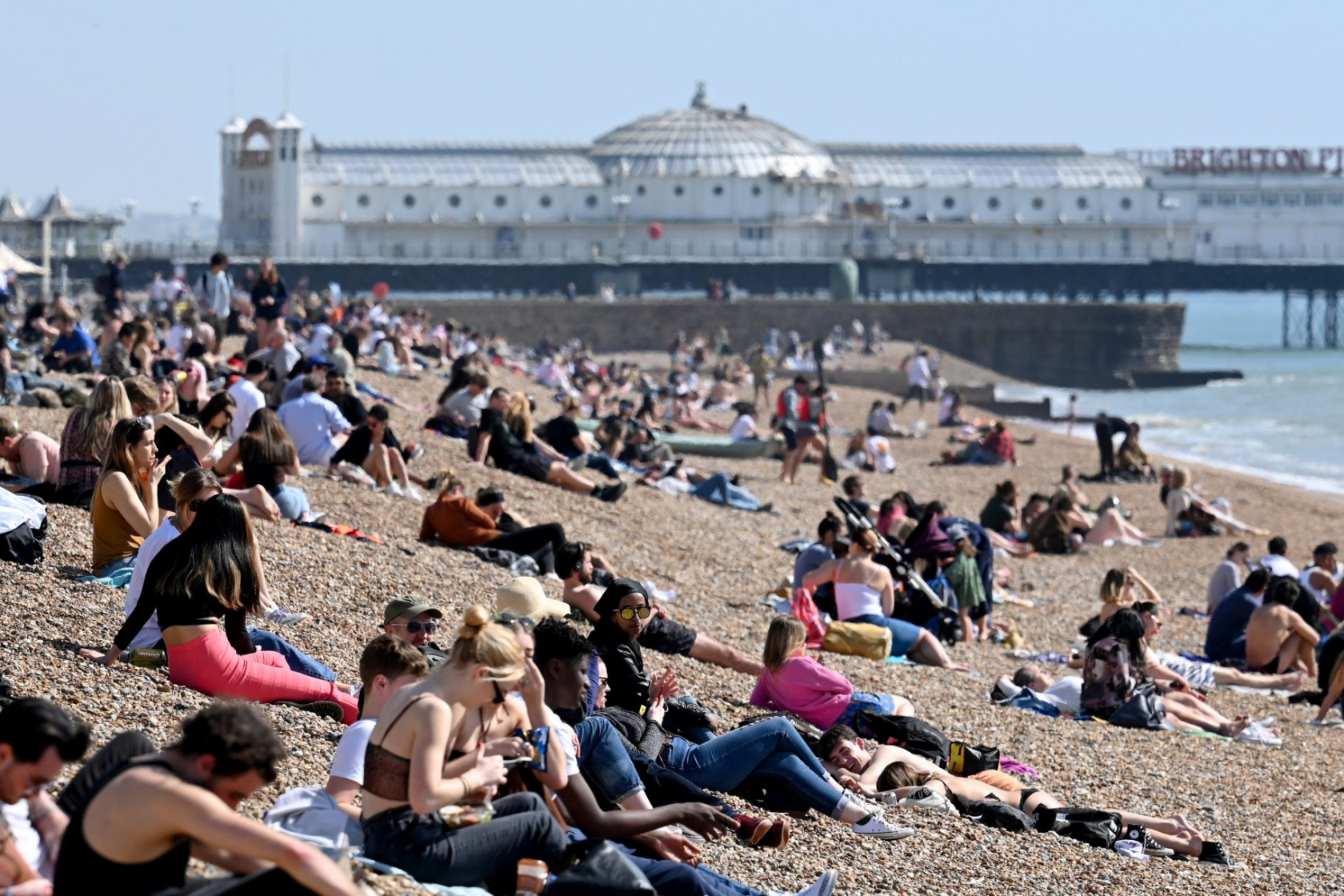Home » Health News »
Feeling on edge? The hot weather could be to blame
If this weekend’s hot temperatures have left you feeling more anxious than usual, you’re not alone. We spoke to experts to find out why anxiety spikes when the weather gets warm in the summer, and what you can do about it.
In the same way that the dark, cold weather of winter can take its toll on our mental health, the heatwaves that are becoming a regular part of summer in the UK can also have an impact.
Alongside the existence of reverse SAD, heatwaves have the potential to exacerbate pre-existing mental health conditions, including anxiety.
“Hot temperatures can trigger anxiety and cause an increase in the stress hormone cortisol, which can exacerbate your anxiety symptoms,” Caroline Harper, specialist mental health nurse advisor at Bupa UK, tells Stylist.
“Research has shown that our cortisol levels are higher in the summer months compared to winter, and the increased temperatures can cause you to experience restlessness, palpitations, nausea and tiredness – all common symptoms of anxiety.
“You may also feel worried or stressed at the risk of heat-related conditions, such as heat exhaustion and dehydration, which can make you feel even more anxious.”
According to Harper, humidity and warmer temperatures can also be a “big trigger” for panic attacks, because the symptoms associated with heat – dizziness, palpitations and dehydration – mirror those typically experienced when someone is in a state of panic.
These symptoms “can further increase your anxiety and feelings of worry,” she adds.

However, it’s not just the heat itself that can cause anxiety to spike – the social expectations that come with a hot summer’s day can add to your worry, especially if you’re already feeling anxious about socialising after lockdown.
Added to this is the sense that we need to ‘make the most’ of the weather – another feeling that is likely to be heightened due to the pandemic, as it’s easy to feel like we need to make the most of our newfound freedom whenever the opportunity arises.
“Very often, the word ‘should’ can lead to a feeling of anxiety for some people,” explains Dr Rose Aghdami, a chartered psychologist and anxiety specialist. “If you think you ‘should’ be enjoying a barbecue or you ‘should’ be outside all the time because it’s lovely weather for a change, then that puts a lot of pressure on you.”
While some people love nothing more than basking in the sunshine, if you find it hard to cope in the heat, you’re not alone. Of course, if your anxiety is making it difficult for you to live a full life, or you think you may have an anxiety disorder, it’s important to seek professional help (full details can be found at the bottom of this article).
In the meantime, though, we asked Harper, Dr Aghdami and psychologist Dr Zoubida Guernina to share their top tips for tackling heat-induced and summer anxiety. Here’s what they had to say.
1. Drop your shoulders and breathe
When you first start feeling anxious, Dr Aghdami recommends focusing on tackling the physical symptoms. Drop your shoulders, breathe out, then practise abdominal breathing (also known as low or diaphragmatic breathing) by taking low breaths into the belly, rather than high, shallow breaths into the chest.
“By taking charge of your physical state in that simple way, you’ll be able to think more clearly – because no one thinks clearly when they’re in an agitated state,” she explains.
“Then you’ll realise you’ve changed something and made yourself feel more comfortable entirely on your own.”
2.Take control of your surroundings
Don’t allow your anxiety to dictate what you do and where you go, but if you find that intense heat puts you on edge, there are steps you can take to feel calmer.While you can’t control the weather, taking charge of your own physical state can help prevent anxiety from spiralling.
“Keep cool by drinking water, protecting yourself from sunburn and avoiding going out during the hottest hours of the day,” says Dr Guernina. “And try to connect with good friends and do things that you find enjoyable and relaxing.”

3.Challenge ‘what-if’ thoughts
“We believe our thoughts as if they’re facts, and anxious thoughts tend to be future-focused,” explains Dr Aghdami. “They’re usually along the lines of ‘what if’: what if I can’t cope with the weather? What if I get really hot and faint?”
Cognitive behavioural therapy (CBT) focuses on retraining a person’s way of thinking to ease their anxiety. A simple way of reaping some of the benefits of CBT, says Dr Aghdami, is to try to pick up on your “what-if thoughts” and remind yourself that they’re “mostly speculation”.
“Asking yourself questions like ‘what’s the worst that can happen? Am I being rational here?’ can sometimes help ease those what-if thoughts.”
4.Practice positive self-talk
It might sound trite, but reminding yourself that you’ve got through anxious spells in the past can help soothe nerves.
“Positive self-talk can help a person feels like they’re controlling their experience, instead of the weather or the temperature or their physical state controlling them,” Dr Aghdami says.
If you’re stuck on a sweltering bus or in a hot bar and find feelings of unease creeping in, tell yourself that you’ll get through the experience, just like you have before.
“Consciously thinking things like ‘it won’t last long’, ‘I’ve been hot before and I’ve managed it previously, so I can manage it again’ or ‘I’m feeling a little bit better now than I did before’ can all help manage feelings of anxiety,” says Dr Aghdami.
Or – perhaps most comforting of all – remind yourself that hot weather never lasts long in the UK.
If you, or someone you know, is struggling with their mental health or emotional wellbeing, you can find support and resources on the mental health charity Mind’s website and NHS Every Mind Matters or access the NHS’ guide to local mental health helplines and organisations here.
If you are struggling, you can also ask your GP for a referral to NHS Talking Therapies, or you can self-refer.
You can also call the Samaritans in the UK on 116 123 or email [email protected] for confidential support.
This article was originally published in July 2018 and has since been updated throughout.
Images: Getty/Pexels
Source: Read Full Article



